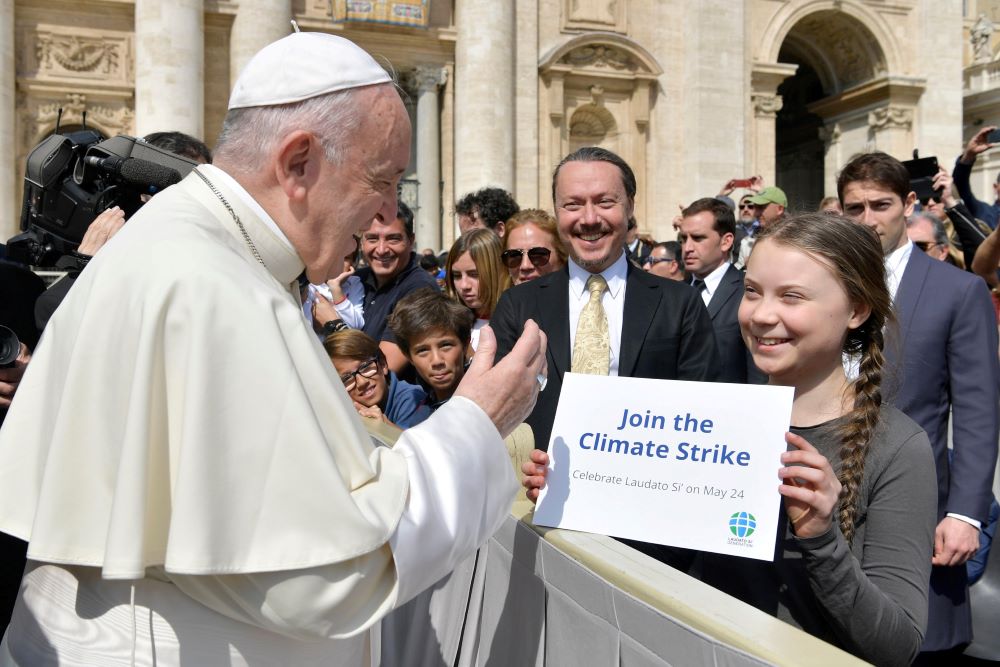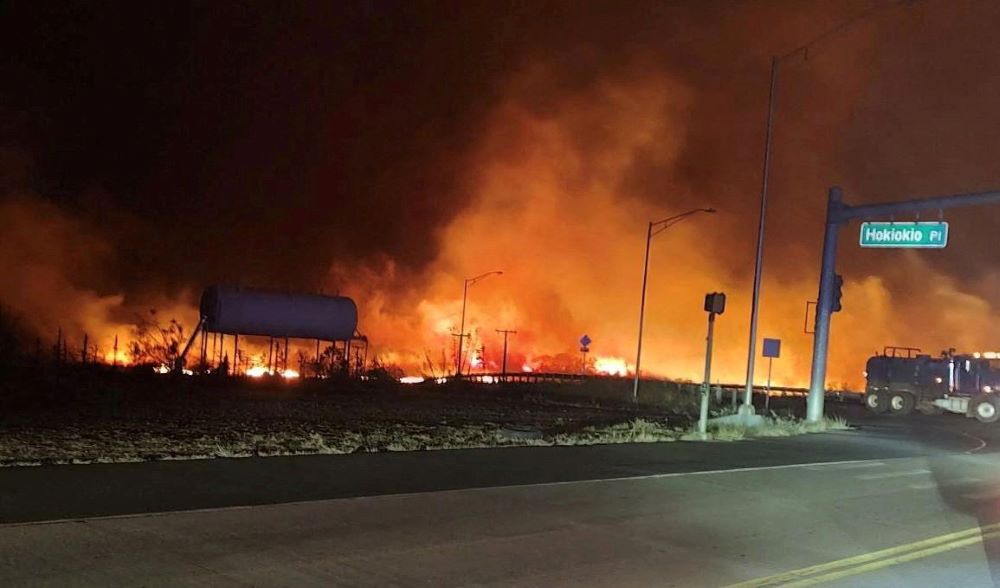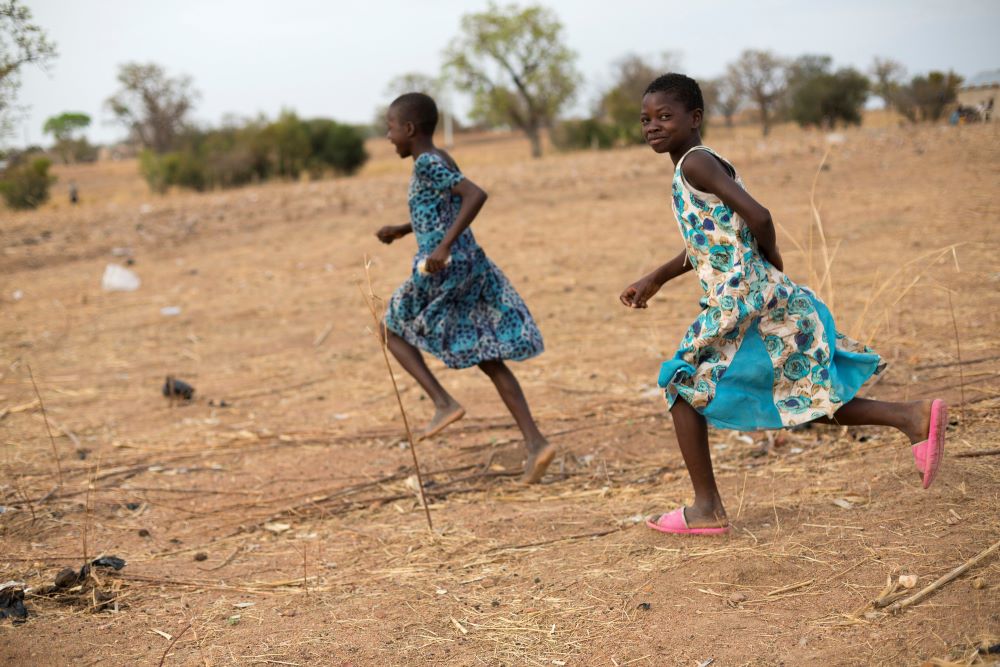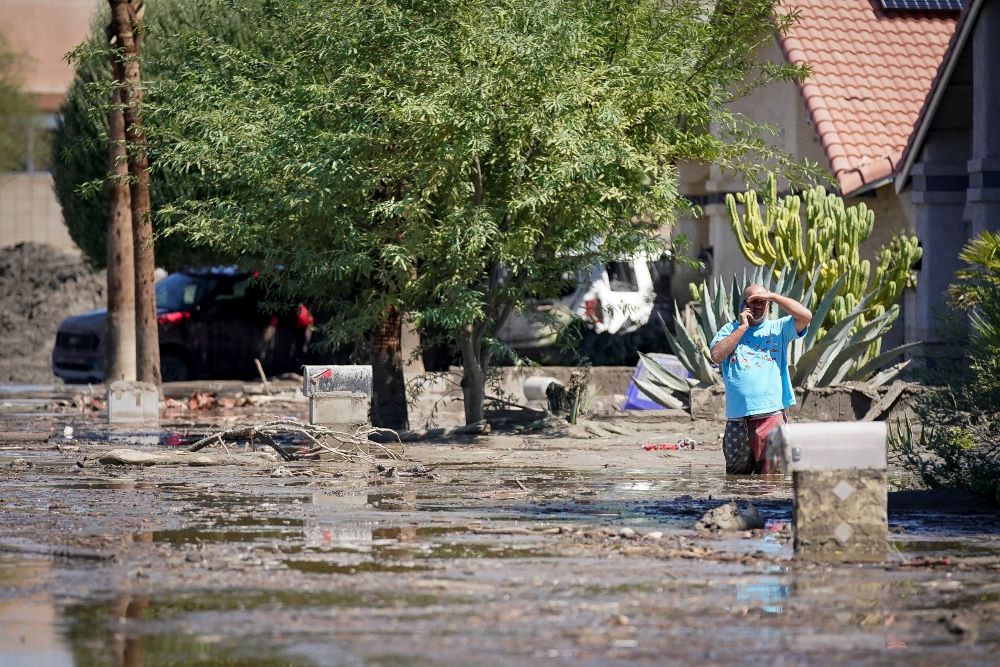
Pope Francis greets Swedish climate activist Greta Thunberg during his general audience in St. Peter's Square at the Vatican in this file photo from April 17, 2019. In her 2019 address at the World Economic Forum in Davos, Switzerland, Thunberg said of the climate crisis: "Our house is on fire. I am here to say, our house is on fire." (CNS/Vatican Media)
With a degree of urgency appropriate for the planetary catastrophe we face today, Pope Francis' latest apostolic exhortation, Laudate Deum, "to all people of good will on the climate crisis," builds on the important insights of his 2015 encyclical letter "Laudato Si', On Care for our Common Home." That the pope has explicitly described the current state of the climate as a "crisis" could be viewed as affirming what climate activist Greta Thunberg said in her 2019 address at the World Economic Forum in Davos, Switzerland: "Our house is on fire. I am here to say, our house is on fire."
Later in the same address, Thunberg pleaded to all who would listen: "We are now at a time in history where everyone with any insight of the climate crisis that threatens our civilisation — and the entire biosphere — must speak out in clear language, no matter how uncomfortable and unprofitable that may be. We must change almost everything in our current societies."
Laudate Deum is, in a sense, Pope Francis's response to Thunberg's own exhortation.
Like the oracles of other prophets, the pope's message is one sure to upset the powerful, wealthy and comfortable.
While in the buildup to its release some people have been describing this document as a second Laudato Si' or, more colloquially, its "sequel," the pope presents this text as more of an addendum and update to his earlier encyclical. He states in the opening section of the new exhortation that Laudato Si' was his effort to share with us his "heartfelt concerns about the care of our common home." However, in the eight years since Laudato Si' was promulgated, the situation has grown into a graver emergency with the stakes increasing by the day.
He writes: "with the passage of time, I have realized that our responses have not been adequate, while the world in which we live is collapsing and may be nearing the breaking point. In addition to this possibility, it is indubitable that the impact of climate change will increasingly prejudice the lives and families of many persons. We will feel its effects in the areas of healthcare, sources of employment, access to resources, housing, forced migration, etc."
What follows is both an exhortation in the truest sense — a written or spoken message that emphatically urges someone to do something — and an apologia, a theological and rhetorical defense of truth and faith. On this latter point, Laudate Deum reads like the treatises of the early Christian theologians (think the second century St. Irenaeus of Lyons, for example) who sought to articulately defend the fundamentals of Christian faith against cultural and religious skepticism or hostility. These theological "apologists" often also used the best intellectual and cultural resources of the time to make their points.

A wildfire burns on the island of Maui near an intersection in Lahaina, Hawaii, Aug. 9. (OSV News/Zeke Kalua/Reuters/County of Maui handout)
In this exhortation, Pope Francis does likewise. He draws on clear, intelligent, scientific data from sources that include the Intergovernmental Panel on Climate Change, the United Nations Environment Programme and the National Oceanic and the U.S. Atmospheric Administration (NOAA). He also draws on many great resources from within the Catholic Church, including previous encyclicals, Scripture and spiritual writings like that of St. Francis of Assisi, of course.
What is striking about the powerful tone of Laudate Deum is the way in which the pope does not shy away from addressing climate change deniers head-on, including those within the faith community. In fact, he says: "I feel obliged to make these clarifications, which may appear obvious, because of certain dismissive and scarcely reasonable opinions that I encounter, even within the Catholic Church."
There is a clear prophetic valence to this text, and it bolsters the rhetorical style of an exhortation and apologia. The biblical prophets were always able to see at once both the world as it truly is ("the signs of the times," as the Second Vatican Council put it) and the world as God intends it to be and calls us to live. The prophet proclaims the gap between those two visions, and exhorts the hearers to repent, change and live according to God's will. And Pope Francis spends a good amount of time examining the world as it truly is, decrying the worsening circumstances of our "common home" on account of human indifference and what he calls the "technocratic paradigm."
Like the oracles of other prophets, the pope's message is one sure to upset the powerful, wealthy and comfortable. In our contemporary context, those who benefit most from the circumstances that are contributing to the climate crisis are those who live in the Global North, especially in North America. Pope Francis explicitly calls out the United States and similar countries for their disproportionate impact and, therefore, disproportionate responsibility to do something.
If we consider that emissions per individual in the United States are about two times greater than those of individuals living in China, and about seven times greater than the average of the poorest countries, we can state that a broad change in the irresponsible lifestyle connected with the Western model would have a significant long-term impact. As a result, along with indispensable political decisions, we would be making progress along the way to genuine care for one another.

Children in Ghana run together through a dry field that has been severely affected by irregular weather patterns caused by climate change in this Oct. 4, 2022 file photo. (CNS/Courtesy of Catholic Relief Services/Jake Lyell)
As Scripture recounts, those who benefit from the unjust status quo are typically not happy with the prophetic message and seek to silence the prophet, which might explain why the center of anti-Francis hostility is found in the United States.
It is also interesting that, early in the document and shortly before mentioning the United States for the first time, Pope Francis notes that the climate crisis is a life issue! He writes: "This is a global social issue and one intimately related to the dignity of human life." As someone who has previously argued in these pages that "climate change is the most important life issue," I was delighted to see the pope directly express this point.
Overall, I think this apostolic exhortation is an important addition to Laudato Si', which is itself prophetic in so many ways. However, for all that the prophetic and apologetic tenor Laudate Deum accomplishes, it still falls short of fully embracing the radical vision of God's family of creation found in the writings and model of the pope's namesake: St. Francis of Assisi.

A man stands in mud as he surveys the damage in his front yard in Cathedral City, Calif., Aug. 21, after Tropical Storm Hilary swept through the area. Hilary was the first tropical storm to hit Southern California in 84 years (OSV News/Reuters/Bryan Woolston)
It's true that Pope Francis comes close — drawing on the medieval saint's inspiration to frame his magisterial teaching — and even affirms the inherent interconnectedness and interdependence of the community of creation. "God has united us to all his creatures. Nonetheless, the technocratic paradigm can isolate us from the world that surrounds us and deceive us by making us forget that the entire world is a 'contact zone.'" And, later, he adds: "human life is incomprehensible and unsustainable without other creatures."
Earlier in the exhortation, he also stated that, "the world that surrounds us is not an object of exploitation, unbridled use and unlimited ambition. Nor can we claim that nature is a mere 'setting' in which we develop our lies and our projects." He then quotes Laudato Si' and writes: "For 'we are part of nature, included in it and thus in constant interaction with it,' and thus 'we [do] not look at the world from without but from within.' "
Advertisement
And yet, if unbridled anthropocentrism and uncritical embrace of a technocratic paradigm are at the heart of the urgent climate crisis before us, then perhaps we need a paradigm shift, a different hermeneutical approach to seeing ourselves and the rest of creation. St. Francis of Assisi made it clear that he recognized that we are part of God's creation, that indeed we are creatures too, and that until we recognize that we are part of the divine family of creation and not merely stewards, gardeners, tillers or any other sort of hired hand on behalf of God, then we will continue to delude ourselves into thinking we are always an arm's-length (or more) from the rest of the created world.
Despite the areas that could have been improved in the tradition of St. Francis, Pope Francis's exhortation is still a powerful apologia for why people of faith cannot exempt themselves from the work that is needed today. As he says near the conclusion of the text, there is always something we can do and "every little bit helps."







